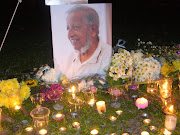Foreign ministers from the Association of Southeast Asian Nations or ASEAN will be meeting
NEXT Monday 19 May in Singapore to talk about helping Burma which was hit by
cyclone nargis more
THEN TWO WEEKS AGO,
ASEAN aid meeting on Myanmar seen offering little
By Neil Chatterjee
SINGAPORE, May 13 (Reuters) - Southeast Asian nations will meet next Monday in Singapore to discuss help for cyclone-hit Myanmar, but analysts say the group will not commit to a regional aid package or apply much pressure to speed up relief efforts.
The Association of Southeast Asian Nations said on Tuesday it was sending an emergency rapid-assessment team to Myanmar, which will report to the meeting, but critics said the group was moving too slowly given Cyclone Nargis struck the country on May 2.
So far, members Singapore and Thailand are among countries to give assistance, including food, medicine and offers for rescue teams, but there has been no coordinated regional response from a grouping that aims to maintain peace and integrate economically.
ASEAN has a long-standing policy of not interfering in the internal affairs of member states.
"ASEAN normally doesn't give as an organisation because it doesn't have the assets -- there may be an increase in individual contributions," said Rodolfo Severino, ASEAN Secretary-General from 1998-2002 and research fellow at the Institute of Southeast Asia Studies in Singapore.
Ngurah Swajaya, director for ASEAN political and security affairs at Indonesia's foreign ministry, told Reuters Myanmar's foreign minister Nyan Win will brief the other foreign ministers at the meeting, to assess needs for relief and reconstruction.
Between 1.2 and 1.9 million people are struggling to survive in Myanmar's Irrawaddy delta, where delays by the military government in admitting large scale aid are threatening a massive humanitarian disaster [ID:nBKK297260].
Up to 100,000 are dead or missing.
"It's shocking that it has taken ASEAN nearly 3 weeks to organise a meeting to deal with the biggest humanitarian disaster to hit ASEAN since the tsunami," said Debbie Stothard, co-ordinator for the NGO Alternative ASEAN Network on Burma.
"This is the time when ASEAN has to prove itself -- it has the potential to take leadership of this situation," she said. "ASEAN has got to bring the Myanmar regime into the 21st century -- not a medieval approach to natural disasters."
SHARP CRITICISM
Myanmar's military rulers have come under criticism from the United States, which already imposes sanctions on the junta, for being slow in allowing in aid workers.
Severino said ASEAN members had not faced difficulties in getting aid to Myanmar, other than destroyed infrastructure. He said ASEAN was unlikely to use a carrot and stick approach in offering assistance in exchange for greater openness or moves towards democracy.
"I don't think ASEAN does things that way...People are dying and countries should not make political points," he said.
ASEAN foreign ministers signed a regional agreement on disaster management and emergency response in Vientiane in 2005. She said ASEAN would bear the brunt of a relief effort that is only delivering an estimated one tenth of the supplies needed, since a social and economic crisis would increase the likelihood of refugees or illegal migrants heading to Thailand and beyond.
"The long delay in having the meeting indicates that, like the regime, they are not taking this crisis seriously, and so we are not at all hopeful that anything positive will come out of it," said Mark Farmaner of the NGO Burma Campaign based in Britain.
"ASEAN's engagement policy has completely failed. They have not elicited a single democratic reform from the regime."
(Additional reporting by Ahmad Pathoni in JAKARTA and Koh Gui Qing in SINGAPORE)
During the
saffron revolution last year,
altsean-burma issued a briefer called
ASEAN SHOULD STOP PASSING THE BUCK ON BURMA,
The briefer asserts that ASEAN countries must exercise their substantial influence on Burma’s military leaders to secure the delivery of genuine political and economic reforms, instead of using China as an excuse for inaction. The briefer reveals that:
* Burma relies on petrol and diesel supplies from Malaysia and Singapore to keep business running and military vehicles on the road. The military is the biggest consumer of fuel.
* Burma relies on trade with ASEAN for 51.3% of foreign exchange revenue, with gas sales to Thailand alone accounting for 48.4% in 2005/06.
* Burma relies on Thailand and Singapore as their biggest sources of new Foreign Direct Investment, constituting a total of 98.61% of FDI in the past 2 years.
* Burma relies on Singapore’s financial services to store and move the wealth that they drain away from Burma.
The briefer recommends an ASEAN freeze or even a slowdown on economic, material, and diplomatic support in order to shepherd the regime to political dialogue and the achievement of genuine reforms. Action should include a temporary freeze on large Burmese-held bank accounts and other financial assets in Singapore as part of a money-laundering review.
I have to agree with JOTMAN when
he wrote,
Perhaps that is the whole point. This way the focus of the meeting can be how to profit from reconstruction after the disaster.
It'll be deja vu when the talkshop meets in Singapore next week. End result will be the same as before, the Burmese people will continue to suffer under the bastard generals and business will go on.














No comments:
Post a Comment